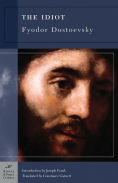I remember this book from my childhood. It was on a top shelf in the study, a small room lined with bookcases. Aside from the many-volumed encyclopedia and my grandfather’s law books, most of the shelves were filled with my father’s medical books. We children would pull them down when we wanted to scare ourselves and each other with the photos of rare diseases. So when I saw this book with the title in large letters on the spine, above my reach, I assumed it was another medical book, describing some form of mental disability.
I must have been curious, though, because it is the only title I remember from those walls.
Although I read a lot, I’ve only recently begun to catch up with the classic Russian authors. The Idiot begins with young Prince Muishkin, 26 or 27 years old, traveling by train to St. Petersburg from Switzerland where he’d spent several years being treated for severe epilepsy. He meets two men: Parfen Rogojin, a pale man of about the same age with fiery eyes, and Lebedeff, a social-climbing clerk of about 40.
The two are amused by the prince, who is inappropriately dressed for the cold and who answers their questions with a naive honesty and openness that makes them think him simple-minded. The prince reveals that he has no other plan but to look up a distant relative, Mrs. General Epanchin (Elizabetha Prokofievna). The two take him in hand.
I won’t try to summarise the complicated plot and large cast, but the heart of the book is the prince, whose artless innocence wins over everyone he meets. Dostoevsky said that he wanted to write a novel about a completely good and moral man. Of course, like others the prince has been compared to since, such as Don Quixote and Jesus himself, he brings trouble on himself and those around him. Most people, including the prince himself, call him an idiot, thinking his innocence and epilepsy symptoms of a feeble brain. Gradually, though, they come to appreciate his wisdom and deep insight into those around him.
The prince falls in love with two women who—to their own surprise—both love him back: Nastasia Philipovna, a woman who has been used as a concubine by a man who adopted her as his ward and whom Rogojin also loves, and Aglaya, the youngest and most beloved Epanchin daughter. As A.S. Byatt astutely observes in her review of a recent translation:
The women think they are in a story about seduction, rape, proposals, money and marriage, like most novels in the realm of the passions and economic forces. The prince is in some absolute moral world in which he can instinctively gauge who is being cruel to whom, who is in need and who is tormenting or tormented, without having in him any genuine sexual response of his own to help him to judge his own effect on people.
I found this novel compelling, though I certainly understand the complaints of critics who find the plot contrived and the characters flat. What most impressed and unsettled me was Dostoevsky’s technique of presenting some incident or fact as though we already know all about it, whereas in fact he only explains it some pages or chapters later. At first I was annoyed, but then I realised this was how the prince must feel, adrift in a world where everyone seems to know the rules except him. At the same time, he is utterly sure of his own understanding.
As writers, we are taught that to make characters seem real they must be neither entirely good nor entirely bad, but some mixture. Dostoevsky’s challenge here is to make the purely good prince seem real. He makes the other characters complex enough, like Mrs. General Epanchin berating those whom she most cares for and worries about, or Rogojin who is alternately selfless and grasping.
I think Dostoevsky succeeds in making the prince real. Perhaps that is because I have known a few such people, not perfect certainly, but so innocently good that your heart aches for them, knowing the hurts they will encounter. I’m glad I waited to read this novel. I don’t think I would have enjoyed it so much if as a child I had pulled it down from that top shelf.
What Russian classic have you read that impressed you?

